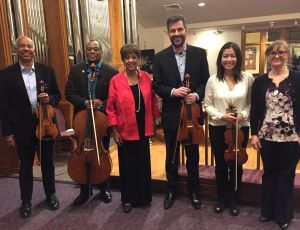Each summer, the Brevard Music Center Orchestra amazes me with the speed at which it develops a sense of tight ensemble. By the second week, this orchestra sounds as though the musicians had been playing together for years. Admittedly, this year’s opening program was not a challenging one, consisting of three familiar pieces for orchestra and the orchestral accompaniment for a number of familiar arias and songs. But my understanding is that there were only three rehearsals (“two and a half” according to one source), which is in line with the time allotted to fully professional orchestras to prepare this kind of musical fare. And two-thirds of the members of the BMC Orchestra are students.
Brevard Music Center faculty provide the other one-third, including the principal chairs. I had not previously heard some of these faculty in principal roles, and two of these newcomers came into focus immediately. Felix Wang, principal cello for the evening, electrified the audience with his initial solo passage in Rossini’s William Tell Overture. Then in the pastoral third section of this work, principal flutist Marianne Gedigian caused me to sit up and marvel at another passage of great beauty. This is Gedigian’s first year and Wang’s second year on the summer faculty, and their presence is further indication (if I needed any) that the quality of this summer institute continues to improve year by year. It is now nationally and internationally sought after, and accepts but one student out of each five who apply.
Conductor Steven Smith carries a larger burden now that Keith Lockhart is Music Director. (Lockhart is in residence only part of the time, while previous Music Director David Effron spent the full seven weeks in Brevard.) Smith communicates well with the orchestra, providing some of the attention to details that is needed for young musicians, however talented they may be, who are still learning standard repertory. Smith was especially good at providing direction to the orchestra while accompanying guest tenor Stanford Olsen in his selections.
Olsen’s voice showed moments of discomfort in his first two arias (from Verdi’s Rigoletto and Donizetti’s L’elisir d’amore). He then called for a bottle of water from the wings and was in top form for “De’ miei bollenti spiriti” from Verdi’s La Traviata. It was a warm evening, and on stage under the lights the heat must have been formidable.
The orchestra provided respite with Mascagni’s “Intermezzo,” from Cavalleria rusticana, before Olsen continued with three well-beloved Italian songs, including Leoncavallo’s “Mattinata,” in which the tenor unleashed his full power. Olsen reminds me of an old baseball pitcher. He does not have the stamina or power that he had when he debuted opposite Joan Sutherland at the Metropolitan Opera in 1986, but with a judicious choice of programming he can fully satisfy us with his musicianship and skill. Now teaching at Florida State University and continuing as a coach for the Metropolitan Opera’s Young Artist Development Program, he is a dedicated teacher and a valued visitor to Brevard.
The orchestra opened the second half of the program with a fine rendering of Leonard Bernstein’s “Symphonic Dances,” from West Side Story. The percussion section, composed of three students working alongside faculty member Conrad Alexander, was kept very busy in this work and acquitted themselves very well. Felix Wang again impressed in a solo passage, and Maestro Smith showed excellent traffic management, including a cue for the police whistle! For me, this was the top performance of the evening.
Four of George Gershwin’s best songs, sung with great affection and skill by Olsen, formed a set that ended the night. These included one of my all-time favorites, “By Strauss,” with its wonderful Ira Gershwin lyrics, as well as “I Got Rhythm” to close on an upbeat note.
Concerts at the Brevard Music Center continue through August 9. For details, see our calendar.











